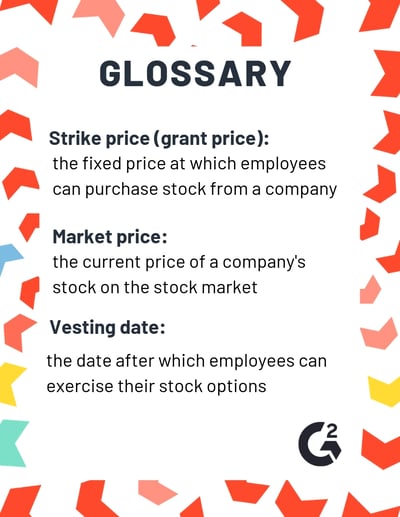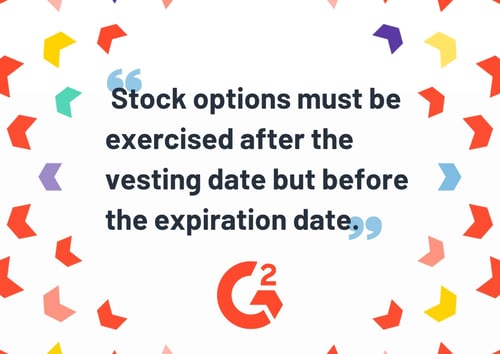“Give me my check...or pay me in equity,” sang Beyoncé on a single off her joint album with husband Jay-Z.
If the unadulterated opulence that comes across in the song’s music video is any indication, Beyonce knows how to get paid: but what does it mean to be paid in equity? Is it really the same as getting paid in a check?
Not quite, but like Beyoncé, many employees have the opportunity to be “paid in equity” through stock options—and could end up turning a Beyoncé-sized profit.
What are stock options?
Stock options are stocks companies sell to their employees at a special price not available to the public (whether or not the company has had its IPO). They are an increasingly common amongst startup companies, not only as an employee benefit but a smart way to structure company finances. Like any investment, however, there are risks involved in stock options, and they can be confusing. This article aims to shed light on the risks and benefits of stock options.

How do stock options work?
Stock options start as an offer from a company. The company notifies eligible employees that they have the option to purchase X number of shares of company stock at X price. The price is called the strike price, or grant price.
Strike price is the price at which the stocks are offered to the employees. Regular stocks can change in price, according to the conditions of the stock market. The current price of a public stock is its market price.
In addition to strike price, when a company offers stock options to its employees, it also must notify them of the vesting date and expiration date. The vesting date is the date after which employees can exercise (or purchase) their stock options.
Once the vesting date has passed, it’s up to employees to decide whether or not they want to purchase stock options, and what to do with them once they’ve been purchased. The date that an employee chooses to buy stock options is called the exercise date. Typically, stock option agreements include an expiration date by which they must be exercised as well.

When should you exercise your stock options?
There are several factors including company size, IPO date, and future success, that could influence your decision to exercise stock options. If you are one of the first employees at a company and you are offered a very low strike price for your stock options, then you may want to exercise right away. If your company is growing or about to go public, you might want to wait for a better opportunity.
Even if you quit or get fired, companies usually have a policy that will allow you to exercise stock options for a period of time following your termination.
After exercising stock options, employees decide whether to keep or sell the stock. It may appreciate in value over time. If the company is publicly traded, the employees may sell their stock on the stock market to make a profit. The more the market price rises above the strike price of the stock options, the better the opportunity for employees to cash in.
Are stock options taxed?
Sometimes they are, sometimes they’re not; it depends on the criteria of the offer. If your stock options are incentive stock options, or ISOs, chances are you don’t have to pay taxes on them—at least not right away. Non-qualified stock options, also known as NSOs or NQs on the other hand, are typically taxed. Make sure to check your stock option terms of the agreement to find out if your stock options are ISOs or NSOs, and know the difference between the two.
ISOs
When an employee chooses to exercise an incentive stock option, they do not pay taxes on their purchase. Oftentimes, the money used to purchase ISOs comes straight out of an employee’s paycheck pre-tax, similarly to a commuter benefit or HSA deposit. The tax advantage is with the employee in this case. However, if and when the employee decides to sell the stock later, they are subject to taxation.
NSOs
Non-qualified stock options are simply stock options that do not qualify to be ISOs. This means that taxes must be paid by the employee when exercising them, but that’s not to say they aren’t worth investing in. The company has an advantage in this scenario because the employees are footing the tax bill. Unlike ISOs, NSOs can be offered to contractors or consultants, not just the company’s own employees, so there’s more flexibility than there is with ISOs.
Why do companies offer stock options?
Company stock options are an incentive for employees to stay with the company longer and work harder because they want the company to do well. They can make employees feel as if they are part of the big picture because they have the opportunity to own company equity.
If a company cannot afford to pay its employees as much as its competitors, stock options might be a way to attract better job candidates. Even though employees won’t be making as much money outright, if they get a good strike price on a young company’s stock as part of their stock options, they could make more money selling their shares in the future. Equity management software can help companies determine whether employee stock options are a viable benefit to offer to staff.

When life gives you stock options, make lemonade!
If you’re still confused about stock options, don’t worry—they’re optional! There is no consequence for not exercising them, although you may be missing out on an opportunity to own part of the company you work for, or make some more money in the stock market and get to Beyoncé's level.
 by Maddie Rehayem
by Maddie Rehayem
 by Maddie Rehayem
by Maddie Rehayem
 by Maddie Rehayem
by Maddie Rehayem